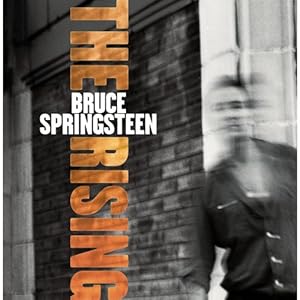A lot had changed between the Tom Joad release and July, 30th 2002, when The Rising hit store shelves. Seven years had passed. There was a reunion with the E-Street Band that prompted a very successful, financially and artistically, tour. On that tour Bruce also has said he found his "Rock 'n Roll voice" again, which he'd felt like he lost during the Tom Joad period...
...And, on September 11th, 2001, Islamic radicals slammed jet airliners into the World Trade Center towers and the Pentagon, as well as crashing another into the Pennsylvania countryside. It was the largest attack on American soil since Pearl Harbor. The country was in shock.
Springsteen tells a story of driving in New Jersey after 9/11, when a truck pulled up next to him, and the man inside leaned out and said, "we need ya, Bruce."
I kinda get choked up thinking of that. As an artist, you always want something to let you see that you've touched people. Something to show that you've struck a chord, and given something to the world that hits home. I can't even imagine how it feels to have someone, even if it's just one guy in a pickup, tell you that, in the darkest times, you can give comfort.
Now, to a lot of people, that may seem like a silly thing, but what that driver understood, and being from the great state of New Jersey probably biased him, but what the hell, was that Springsteen has always been a voice to confront and transcend the darkest of times. In album after album, song after song, Bruce is willing to write songs that say, in no uncertain terms, that it's dark out there, but he also never fails to find those lights of hope.
The Rising is a testament to Springsteen's ability to see events and times from many, many angles. To see beyond the empty posturing that was being shilled out by one-note cretins like Toby Keith at the same time. Bruce says it himself, in Lonesome Day;
I think it's no accident that this is the song that kicks off the album.Hell's brewin' dark sun's on the rise
This storm'll blow through by and by
House is on fire, Viper's in the grass
A little revenge and this too shall pass
This too shall pass, I'm gonna pray
Right now all I got's this lonesome day
It's allright - It's allright - It's allright
Better ask questions before you shoot
Deceit and betrayals bitter fruit
It's hard to swallow, come time to pay
That taste on your tongue don't easily slip away
It's easy to say, "we're coming to kick your ass," but the real question is, what does that do to us, in the process? The Rising takes us in many directions, but the ultimate thrust is to take a look at what we've lost. To stop and think about the very personal stories of those who were taken, of those who went face-first into death. There is not one, single track here that addresses a major political point, it's all about people. While others turned their gaze (and I'm going to say it, hate) outward, Bruce looked inside, and tried to find the places to start healing.
The title track itself is heartbreaking in it's clear imagining of the last moments of a first responder. Jumping back and forth from images of effort and strain to serene thoughts of family. There's no need for details or comments about the Twin Towers, this is about music, and feeling, not facts. The generic nature of what's sung reminds us that these men and women do this every day, and face the same end every day. The firemen, policemen, and EMTs at the WTC on 9/11 are know in history because of the enormity of the event, but every house fire contains the potential for the same result.
The album, to me, feels like a guide through the whole, terrible process of grief, from bargaining in Counting on a Miracle, to the pride and honor of Into the Fire, to survivor's guilt in Nothing Man. Springsteen weaves a tapestry of pain and healing, reminding all of us that it's a long, slow process to become whole. Of course, it's Springsteen, and he's not going to let us forget that sometimes you just need to have a party and be thankful you're still here, possibly at Mary's Place, or in a more intimate vein.
The Rising really represents a re-invigoration of Springsteen as an artist. While other classic rock acts have shuffled into a nostalgia-fueled "elder statesmen" status, Springsteen, in one fell swoop, created an album that was, in many circles, THE statement on 9/11. We all love The Rolling Stones, and I actually like many of their more recent albums, but when was the last time a Stones album really meant something, other than another massive tour? The Rising was immediate and powerful, it didn't trade on past glories, it merged with what you were feeling right at that moment.
Brendan O'Brien had sole producer's credit. I'll admit, I found it odd for a producer associated with acts like Pearl Jam and Stone Temple Pilots to be working with Springsteen. Although, I'd liked a lot of his past work, including the Dogman album by one of my personal favorites, King's X. Yet, clearly Bruce and O'Brien hit it off, as they've been a team ever since.
We also can't fail to mention that The Rising also heralded the return of the mighty E-Street Band to a full Springsteen album. Clearly, the reunion tour had been a fantastic experience for Bruce, and it's been made clear that the E-Street band will forever be an option, as long as Springsteen is still making records.
Although, not one that he would always use....

No comments:
Post a Comment